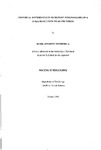INDIVIDUAL DIFFERENCES IN SECRETORY IMMUNOGLOBULIN A (S-IgA) REACTIVITY TO ACUTE STRESS
| dc.contributor.author | WETHERELL, MARK ANTHONY | |
| dc.contributor.other | School of Psychology | en_US |
| dc.date.accessioned | 2013-11-01T13:09:14Z | |
| dc.date.available | 2013-11-01T13:09:14Z | |
| dc.date.issued | 2002 | |
| dc.identifier | NOT AVAILABLE | en_US |
| dc.identifier.uri | http://hdl.handle.net/10026.1/2546 | |
| dc.description.abstract |
Secretory immunoglobulin-A (S-IgA) is an antibody found on all surfaces of the common mucosa and serves as a first line of defence against pathogens. S-IgA is the predominant antibody in human secretions and unlike many other immune parameters, can be measured non-invasively in saliva. In addition to being an efficient indicator of health status, S-IgA levels are sensitive to variations in subjective and objective levels of stress, both of which are also influenced by state and trait factors. Stress is known to play an important role in susceptibility to infections of the common mucosa, and as such, the role of S-IgA as a potential moderating variable between stress and health is of increasing clinical importance. This thesis assessed the roles of retrospectively reported health status (minor health complaints) and state and trait factors upon levels of S-IgA following acute stress (S-IgA reactivity). Stress was manipulated using a multi-tasking performance battery, which unlike other laboratory based stressors is analogous to a variety of working environments. In a series of studies (3), S-IgA reactivity was observed following the stressor on one occasion, two occasions (24 hours apart) and following repeated stress on one occasion (cumulative acute stress). Volunteers classified as in poor health using a specifically designed health questionnaire, demonstrated consistently reduced S-IgA reactivity when compared to volunteers classified as being in good health. Furthermore, the discrepancy in S-IgA reactivity between good and poor health volunteers was most evident following cumulative acute stress. That is, poor health volunteers demonstrated progressive reductions in S-IgA reactivity as the accumulation of stress became greater. Volunteers in poor health were also characterised by negative state and trait characteristics, which in addition, were also independently associated with reduced S-IgA reactivity to acute stress. The findings indicate that negative state and trait characteristics are associated with reduced S-IgA reactivity to acute stress, levels of which influence post-stress susceptibility to illness. Further, deleterious effects of acute stress are most apparent in poor health volunteers following cumulative acute stress analogous with the stressors encountered in a variety of working environments. | en_US |
| dc.language.iso | en | en_US |
| dc.publisher | University of Plymouth | en_US |
| dc.title | INDIVIDUAL DIFFERENCES IN SECRETORY IMMUNOGLOBULIN A (S-IgA) REACTIVITY TO ACUTE STRESS | en_US |
| dc.type | Thesis | |
| plymouth.version | Full version: final and full version as approved by the examiners at the time of the award of your degree | en_US |
| dc.identifier.doi | http://dx.doi.org/10.24382/3521 | |
| dc.identifier.doi | http://dx.doi.org/10.24382/3521 |
Files in this item
This item appears in the following Collection(s)
-
01 Research Theses Main Collection
Research Theses Main


